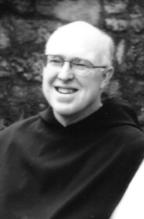The Solemnity of All Saints
[Scripture Readings: Rev 7:2-4, 9-14; 1 Jn 3:1-3; Mt 5:1-12a]
 Recently, I was talking to one of the monks at Ava about some of the
Recently, I was talking to one of the monks at Ava about some of the
cardinals who are eligible to be elected Pope. The brother said, “I believe the Cardinal of Paris has a Jewish mother. If he is elected he will be the
second Jewish Pope.” This caught me off guard and I said, “Who was the first?” He
replied, “Peter, of course!” I guess you could say this is “thinking out of the
box.” I suppose when it comes to the saints we need to think out of the box too.
Thinking out of the box means expanding our boundaries-expanding our
horizons. The Feast of All Saints — all canonized saints? Only Catholics? We have a book in our library called All Saints and it lists several for each day of the
year. It’s very inclusive. It includes Gandhi, Martin Luther King, Dorothy Day.
But even here you have to be special to be listed. You have to have achieved
some great work recognized by all as exceptional. I believe today’s feast is
even broader than that. Today we commemorate all who have been redeemed by the
Blood of Christ, “a huge number,” our first reading tells us, “impossible to
count, of people from every nation, race, tribe and language,” .
 What is a saint? St John tells us a saint is someone who is like God. They are like God because “they see God as He really is,” .
What is a saint? St John tells us a saint is someone who is like God. They are like God because “they see God as He really is,” .
There are saints and there are saints. The great saints are held up for our
admiration and encouragement. They are a gift to the Church—like Mother
Teresa—they have a message for us about how to live but today we recall the unknown saints—the ones who are now seeing God face-to-face and becoming like Him.
 If we could examine each of their lives maybe all we would say about them is that they tried—they believed. They lived as best they could—they persevered in their trust in God—they lived the Beatitudes perhaps without even knowing it—perhaps without ever knowing it was the teaching of Jesus. Their desire was true. St Augustine said when commenting on the passage from St. John’s Epistle we just heard, “The entire life of a Christian is an exercise of holy desire. You do not see,” he says, “what you long for, but the very act of desiring prepares you. . . .”
If we could examine each of their lives maybe all we would say about them is that they tried—they believed. They lived as best they could—they persevered in their trust in God—they lived the Beatitudes perhaps without even knowing it—perhaps without ever knowing it was the teaching of Jesus. Their desire was true. St Augustine said when commenting on the passage from St. John’s Epistle we just heard, “The entire life of a Christian is an exercise of holy desire. You do not see,” he says, “what you long for, but the very act of desiring prepares you. . . .”
He goes on to say that by making us wait, God increases our desire. We are in a waiting mode. We have the scent of Heaven in our nostrils, but we cannot
taste it. We see it in the distance, but we do not possess it. As St. Hilary
says, “I have a firm hold on something which I do not understand,” . To live this way is not easy. To live in the land of unknowing—of not understanding can lead to uncertainty and doubt. But if you look at the lives of the saints, they are anything but uncertain, unsure about what they believe and how they live. It is the firmness of their lives that strike us. They have a firm hold on something they do not understand. Their firmness does not come from their penetrating intellect. It comes from their faith. To be a canonized
saint you need heroic faith—but as Yeats says “. . . even the daughter of the swan can share something of every paddler’s heritage,” .
The saints lived in the land of unknowing just as we do but their desires
were great and their faith gave them a firm hold on the mystery of life.
It is our heritage to live without fully understanding. We are not swans, but
we paddle along doing the best we can with the gifts we have. “What we shall
be in the future has not yet been revealed . . . we shall be like Him because
we shall see him as he really is.” This we can be sure of.
